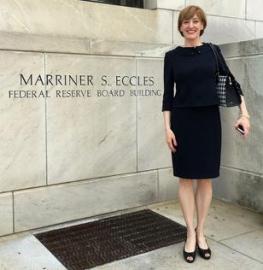
Shame On Washington, DC For Shooting A Messenger Who Warned of Crypto Debacle
Before 1940, investing in mutual funds was like wading into a cesspool. The same is true today of crypto. Just as mutual funds were cleaned up and became essential savings vehicles, the same can be done for crypto as payment systems (including for U.S. dollars). But, sadly, Washington, DC is taking a big step backward.
During the 1930s, the nascent mutual fund industry was rife with leverage, opacity and fraud, and found itself in the government’s crosshairs. Among those seeking a reactionary crackdown was President Franklin D. Roosevelt – one of many in Washington, DC at the time who struggled to separate the model’s potential for unlocking innovation from the grifters exploiting it in its infancy.
To his credit, FDR realized that taxing and regulating mutual funds into oblivion was not in America’s best interest. Working with Paul Cabot, an investment management pioneer who regularly called out the corruption of his industry peers (and who founded State Street), Roosevelt threw his weight behind a smarter solution: the Investment Company Act of 1940. This landmark legislation became a bedrock of modern financial regulation – it limited the use of leverage, enacted standards of disclosure, and created a safer environment that allowed mutual funds to thrive.
History is rhyming. Crypto is at a similar juncture.
Descendants of Paul Cabot recently contacted me to analogize my work today to Cabot’s work in the 1930s. I am humbled they would make such a connection, and can only aspire to a fraction of Cabot’s achievements. Many readers know that I have loudly and consistently warned “leverage and crypto do not mix, period!” (e.g., here) and publicly dressed down prominent bad actors (e.g., here, here). Privately, though, I’ve also been doing a lot more behind the scenes. Today, I’m publicly disclosing for the first time that (1) I handed over evidence to law enforcement of probable crimes committed by a big crypto fraud, starting months before that company imploded and stuck its millions of customers with losses, and (2) I warned bank regulators of the mounting bank-run risk inside the banks serving the crypto industry before the bank runs ultimately hit. How many in crypto correctly foresaw the implosion of the crypto lenders, warned regulators of the impending bank runs and tried to help law enforcement stop a big fraud? Like Paul Cabot did, I’ve been calling out the worst of crypto while trying to build a lawful, compliant alternative that relegates scams to the trash heap. But, while FDR invited Paul Cabot to the Oval Office to work out how to fix the problem, most of today’s policymakers seem intent on killing the high-integrity innovators.
Today’s regulators and lawmakers in Washington are no doubt embarrassed that they failed to stop the criminals of crypto. DC is demanding scalps.
Calls for a crackdown today are coming from many of the same policymakers who were charmed by the fraudsters. In a 180 degree turn, they’re now throwing the baby out with the bathwater.
This was the wrong path in 1940, as it is today.
Fixing corruption in crypto today, as with mutual funds in the 1930s, is not a partisan issue. Yet partisans are nonetheless trying to pull in politics. I reject that.
Custodia Bank recently found itself in the crosshairs of Beltway Politics at their worst. Custodia was simultaneously attacked by the White House, the Federal Reserve Board of Governors, the Kansas City Fed and Senator Dick Durbin (who conflated our non-leveraged, 100-percent liquid and solvent bank with FTX in a Senate floor speech, in which he attacked two companies run by female CEOs – Fidelity and Custodia – implicitly comparing us to a 29-year-old accused fraudster who is now wearing an ankle bracelet).
Custodia tried to become federally regulated – the very result bipartisan policymakers claim to want. Yet Custodia has been denied and now disparaged for daring to come through the front door.

Washington’s misguided crackdown will only push risks into the shadows, leaving regulators to play whack-a-mole as the risks continuously pop up in unexpected places.
Here’s the reality: Internet-native money exists, and it won’t be uninvented. Today, U.S. dollars can move across the internet without banks and without permission, settling as fast as the speed of light and at a fraction of the cost of incumbent payment systems. This technology will steadily disintermediate traditional banks. Anyone with an internet connection can run the code and use U.S. dollars without banks.
Despite the recent attacks, I remain optimistic regulators will come to realize that antidotes exist to the crypto scams seeping into the system. Few people truly understand how to separate the wheat from the chaff in crypto, and even fewer are at the table with regulators, as I am – though, as of yet, I’ve not been at the table with the decision makers, and wonder whether my warnings were buried in the bowels of bureaucracy.
Paul Cabot came to the table in the 1930s with the credibility to work with FDR to pass the Investment Company Act of 1940. I’m offering to work with policymakers of all stripes to do the same.
It is not partisan to clean up fraud. It’s the right thing to do.
In 1940, if you told people how much innovation would be unlocked by FDR’s decision not to kill the nascent mutual fund industry in the face of rampant corruption, no one would have believed you. I see the same thing in crypto technology. President Biden needs to do what FDR did – bring the Paul Cabots of today to the table.
Founder/CEO Custodia Bank. #bitcoin since 2012. 22-yr Wall St veteran. Not advice; not views of Custodia Bank!
Disclaimer
This web site is limited to the dissemination of general information, investment-related information, publications, and links.
Please consult important additional information and qualifications HERE.
View Privacy Policy and Terms of Use
Connect with me on Social Media
Search Posts
Categories
Recent Posts
- How To Keep The Bitcoin Strategic Reserve From Morphing Into A Bailout Fund January 28, 2025
- The Engineering of Bitcoin October 1, 2023
- Here Come The Fintech Banks!! July 21, 2023
- Why Defending The Right of States to Charter Banks Without Federal Permission Is Critical April 17, 2023
- Why Can’t We Just Have Safe, Boring Banks? March 21, 2023